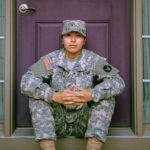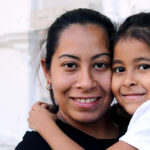
Some tips on responding to the border crisis: Speak up. Read the Bible. Call the government. Reach out to immigrants.
UPDATE: Trump Signs Immigration Executive Order, Some Christians Still Concerned
By Bob Smietana
The estimates are sobering—as many as 30,000 immigrant children could eventually be separated from their families if current policies are not changed, says Alan Cross, a Southern Baptist pastor and author.
Those kids and their families will need help, he says.
Cross outlined some basic steps churches and pastors can take to minister to those affected by the current crisis at the nation’s southern border.
The church can speak out on behalf of immigrants and talk about “God’s heart for people,” he says.
Focus on God’s care for immigrants—and on moral and Christian teaching—when talking about the issue, even to politicians, he says.
“Basically, what is needed right now is for churches to speak to their congressmen, senators, and the president,” he says. “Write op-eds and letters. Connect with local ministries working with immigrants. … This is so much a moral and political crisis where our voice is important.”
Because the Department of Justice’s policy of separating children from their families at the border is new, churches and other ministries are still organizing their responses. Cross hopes to have a list of ministries that churches can partner with in the next week.
For now, he says, churches can get ready to help. That can involve calling the Department of Homeland Security or the Office of Refugee Resettlement to get details on how to help. Or churches can talk to child-welfare organizations about how people can get trained to become foster parents.
Churches can get ready to sponsor families who have been split up, he says.
“Make yourself available,” he says.
Pastors can also talk with their congregations about the Bible’s teaching about immigration and how to treat strangers.
A number of Bible passages and sermon topics, along with other resources, can be found at The Evangelical Immigration Table, a partnership of the National Association of Evangelicals, the Southern Baptist Convention’s Ethics and Religious Liberty Commission, World Relief, World Vision, and other Christian groups.
Matthew Soerens, U.S. director of church mobilization for World Relief, says several nonprofits are working with immigrant kids who have been separated from their parents.
Many of those kids are classified as “unaccompanied minors” if they aren’t reunited with parents, says Soerens.
Bethany Christian Services, he says, helps provide foster care for unaccompanied minors. Right now the group is working in Pennsylvania and Michigan. Catholic Charities also has a similar foster care program around the country, which it runs for the Office of Refugee Management.
Church members can become foster care parents with those programs, he says.
Groups like World Relief are also advocates for a change in the family separation policy, and churches can support that work as well, he says.
“The best situation for these kids is to be with their families,” says Soerens. “It’s going to take a lot of advocacy for that to happen.”
Churches also can become more aware of the root causes of the current crisis. Many of the families at the border are fleeing violence in Central America, says Soerens. In the past, he says, they’d have applied to become refugees.
Since the United States has reduced the number of refugees it will accept, some families have crossed the border illegally so they can apply for asylum, he says.
People fleeing violence in their homelands are allowed to apply for asylum no matter how they crossed the border, according to federal law.
“To obtain asylum through the affirmative asylum process, you must be physically present in the United States,” says the U.S. Citizenship and Immigration Services on its website.
“You may apply for asylum status regardless of how you arrived in the United States or your current immigration status.”
Soerens spent Tuesday in Washington meeting with lawmakers and sharing World Relief’s concerns about the family separation policy.
“I don’t think anyone we met with thinks the policy at the border is a good one,” he says.
Related:
- Keep Immigrant Families Together, Say Evangelicals
- The Immigration Crisis and the Great Commission
- Evangelicals to Congress: Time to Address Immigration
- Attorney General Sessions Sets Off a Wave of Bible Reading

Bob Smietana
Bob is the former senior writer for Lifeway Research. In September 2018, he joined Religion News Service, where he currently serves as a national writer.










